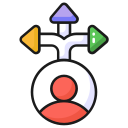Open Source Coding Education
Open source coding education represents a transformative approach to learning programming skills through publicly accessible resources and collaborative platforms. By leveraging the ethos of open source communities, individuals gain the opportunity to explore, contribute, and deepen their knowledge of coding at their own pace and without significant financial barriers. This modern educational pathway empowers learners not only to acquire technical expertise but also to develop problem-solving and collaborative skills that are invaluable in today’s interconnected digital world.
Foundations of Open Source Learning
01
The core philosophy behind open source is rooted in the belief that knowledge should be accessible to all. In educational contexts, this means students and self-learners can tap into extensive code repositories, documentation, and forums free of charge. By encouraging curiosity, experimentation, and collaboration, open source education supports a culture of continuous improvement and adaptation. This inclusivity nurtures diverse perspectives, ensuring technological advancement is not limited by geography, financial resources, or institutional gatekeeping. It transforms learners from passive recipients of information into active participants who shape and advance educational resources for their peers.
02
One of the most compelling strengths of open source coding education is its accessibility. Learners from any background, region, or socioeconomic status can access world-class learning materials and engage directly with real software projects. Unlike traditional curricula bound by rigid structures and limited access, open source environments allow students to learn at their own pace, explore diverse programming languages, and tackle problems relevant to their interests. This flexibility encourages sustained engagement and allows individuals to tailor their learning journey based on personal goals, ultimately resulting in deeper understanding and skill mastery.
03
Community is the backbone of open source coding education. Learners engage with a vibrant network of mentors, peers, and experts who share not just code, but also insights, feedback, and encouragement. This communal approach accelerates learning by providing instant support and validation and fosters a sense of belonging—a factor often missing in solitary self-study. Collaboration within these communities catalyzes innovation, exposes learners to best practices and industry standards, and teaches invaluable soft skills such as communication and teamwork. The relationships cultivated here often extend beyond education into lasting professional networks and lifelong learning partnerships.
Advantages of Open Source Coding Education
Affordability and Democratization
The open source model significantly reduces the cost of acquiring coding skills. Unlike proprietary learning platforms that often come with hefty subscription fees or institutional tuition, open source resources are generally available free of charge, making education widely accessible. This democratization benefits communities that might otherwise be excluded due to financial constraints. By breaking down economic barriers, open source coding education unlocks potential across diverse populations, enabling more people to pursue and achieve careers in technology regardless of their initial resources. Over time, this leads to a more inclusive and innovative tech industry.
Real-World Experience
Engagement in open source projects allows learners to gain practical, hands-on experience that is often missing from traditional educational settings. Contributors work on genuine software products, collaborate with global teams, and tackle challenges that mirror those found in professional environments. This immersion in real-world development processes not only hones coding and problem-solving skills but also introduces essential concepts like version control, issue tracking, and code review. By building an actual portfolio of contributions, learners can demonstrate concrete achievements to prospective employers, thereby improving their job prospects and professional credibility.
Lifelong Learning and Continuous Improvement
Open source coding education is inherently dynamic, driven by the ongoing contributions of a global community. Learners are continuously exposed to new technologies, programming languages, and development methodologies as projects evolve. This constant state of flux fosters a mindset of lifelong learning, where individuals are encouraged to stay curious and agile in the face of change. The feedback-rich environment of open source also ensures that skills remain current and relevant, as peers and mentors help refine code and expand knowledge. Such continual growth is critical in an industry where new innovations rapidly render outdated approaches obsolete.

Pathways to Participation
01
Getting Started with Learning Platforms
A wealth of online platforms have emerged to support open source coding education. These platforms host comprehensive tutorials, video lectures, and interactive coding exercises, all accessible without cost. For beginners, such resources provide a structured and supportive introduction to programming fundamentals and best practices. The interactive nature allows learners to code in real time, receive immediate feedback, and progress through material at their preferred pace. Many platforms also connect learners with mentors and peers, establishing crucial networks of support from the outset.
02
Contributing to Open Source Projects
Once foundational skills are established, contributing to open source projects offers an invaluable next step. Contributors might begin by solving simple bugs or improving documentation before tackling larger features or modules. Through collaboration with experienced developers, learners gain insight into sophisticated coding techniques, project organization, and effective communication. The sense of accomplishment derived from having one’s work recognized and integrated into widely used software is a powerful motivator. Each contribution, however small, not only strengthens technical abilities but also builds confidence and a public record of participation.
03
Building Personal and Community Projects
Open source coding education also enables learners to initiate their own software projects, either individually or by rallying a group of like-minded peers. These endeavors allow for creative expression, experimentation with new technologies, and the addressing of problems or needs pertinent to specific communities. Managing a project fosters leadership, project management, and strategic thinking skills, while open source licensing ensures that outcomes are freely available for others to learn from and improve upon. In this way, individuals transition from consumers to creators, helping to sustain and expand the educational ecosystem for future generations.
